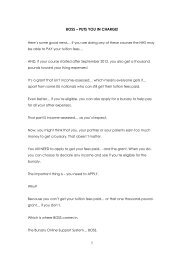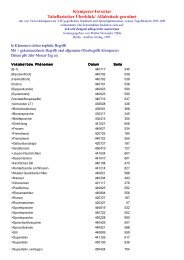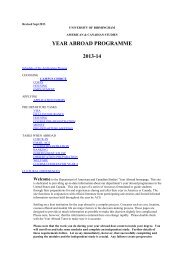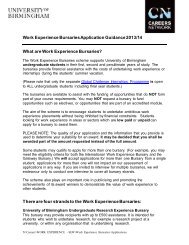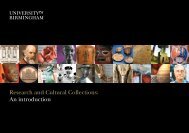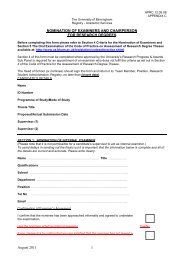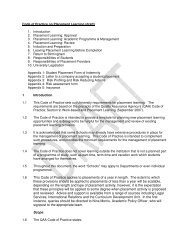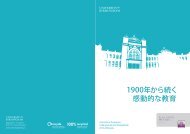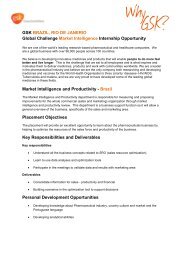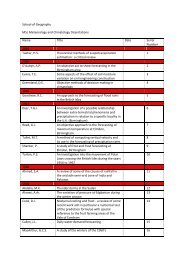You also want an ePaper? Increase the reach of your titles
YUMPU automatically turns print PDFs into web optimized ePapers that Google loves.
<strong>Petrus</strong> <strong>Alfonsi</strong>Pedro Alfonso, Pierre AlphonseDate of Birth Second half of 11 th centuryPlace of Birth UnknownDate of Death Unknown; after 1116Place of Death UnknownBiography<strong>Petrus</strong> <strong>Alfonsi</strong> is one of the key actors in the transmission and assimilationof Arabic scientific, literary and religious texts and ideas toLatin Europe in the early 12 th century. His impact is attested in thesurvival of roughly 160 manuscripts of his works, in the frequent usemade of them by key authors from the 12 th century to the 16 th , and intheir wide diffusion through early printed editions.<strong>Petrus</strong> <strong>Alfonsi</strong> was born Moses, a Jew from al-Andalus. He waseducated in Hebrew and Arabic; his writings show familiarity withthe Talmud, with texts of Arabic astronomy, medicine and philosophy,and with the Arabic wisdom traditions. Moses converted toChristianity, and the first date associated with his life is that of hisbaptism, on June 29, 1106, in the cathedral (and former mosque) ofHuesca. He explains that he took the name <strong>Petrus</strong> in honor of St Peterand <strong>Alfonsi</strong> in honor of his godfather, King Alfonso I of Aragon. Thisprobably indicates that he played a role in Alfonso’s court, perhaps asroyal physician and astrologer.At some point between 1110 and 1116 <strong>Alfonsi</strong> went to England,where he taught astronomy, and in 1116 produced his Tabulae astronomicae(‘Astronomical tables’), a somewhat flawed Latin versionof al-Khwārazmī’s Zīj al-Sindhind, a set of astronomical tables withaccompanying ‘canons’ or explanatory texts. Two of his students inEngland are known by name: Walcher of Malvern and Adelard ofBath. Walcher composed a text on how to predict eclipses, based onthe teachings of <strong>Alfonsi</strong>, and Adelard revised and improved <strong>Alfonsi</strong>’sLatin version of al-Khwārazmī’s text. According to one manuscriptof <strong>Alfonsi</strong>’s Disciplina clericalis (‘Clerical instruction’), he served fora time as royal physician to King Henry I of England. Sometimein the 1120s, it seems, he was in France, as he wrote an Epistola ad
petrus alfonsi 357peripateticos in Francia (‘Letter to the peripatetics in France’), inwhich he complains of his lack of students, professes his expertisein the art of astronomy, and lambastes Latin intellectuals for preferringthe study of grammar and logic to the ‘hard science’ of astronomy.The works of <strong>Petrus</strong> <strong>Alfonsi</strong> provide a fascinating glimpse athow the Latin West adapted and transformed the intellectual andcultural legacy of the Arab world. The historical <strong>Alfonsi</strong> himselfimported new texts and new ideas into England and France: theaphorisms and fables of the eastern Wisdom traditions, astronomicaltexts and knowledge, and his own interpretations of the Qur’an andTalmud suffused with Hispano-Arab religious polemics. He shapedthis knowledge to fit the needs and desires of his pan-European Latinreaders. His rationalistic religious disquisitions reflect the concerns ofthe theologians of the 12 th -century renaissance, of faith seeking understanding.He passionately defended astronomy and affirmed that thestudy of nature could reveal God’s designs for creation. And the moralaphorisms of the Disciplina are directed to the edification of a proudnew educated clerical elite.His readers, copyists and continuers were to perpetuate the processof ‘naturalization’ of the Jewish and Arabic elements of <strong>Alfonsi</strong>’sthought, using the Dialogues to inform a new, harsher anti-Judaism,mining the Disciplina as grist for their sermon tales and instructivefables.MAIN SOURCES OF INFORMATIONPrimary<strong>Petrus</strong> <strong>Alfonsi</strong>, Dialogi contra Iudeos (see list of editions and translationsbelow)<strong>Petrus</strong> <strong>Alfonsi</strong>, Epistola ad peripateticos in Francia, in J. Tolan, <strong>Petrus</strong> <strong>Alfonsi</strong>and his medieval readers, Gainesville FL, 1993, 163-81<strong>Petrus</strong> <strong>Alfonsi</strong>, Disciplina clericalis, ed. A. Hilka and W. Söderhjelm, Helsinki,1911SecondaryI. Resnick, ‘The priestly raising of the hands and other Trinitarian imagesin <strong>Petrus</strong> <strong>Alfonsi</strong>’s Dialogue against the Jews’, Medieval Encounters 13(2007) 452-69W. Drews, ‘Propaganda durch Dialog. Ein asymmetrisches “Selbstgespräch”als Apologie und berufliche Werbestrategie der Frühscholastik’, Francia32 (2005) 67-89
358 petrus alfonsiI. Resnick, ‘Humoralism and Adam’s body. Twelfth-century debates and<strong>Petrus</strong> <strong>Alfonsi</strong>’s Dialogus contra Judaeos’, Viator 36 (2005) 181-95W. Drews, ‘Dogmatischer oder emergenter Dialog? Überlegungen zurKonzeptualisierung theologischer and philosophischer Erkenntnis imHochmittelalter’, Mittellateinisches Jahrbuch 39 (2004) 371-88S. Hotz, Mohammed und seine Lehre in der Darstellung abendländischer Autorenvon späten 11. bis zur Mitte des 12. Jahrhunderts. Aspekte, Quellenund Tendenzen in Kontinuität und Wandel, Berlin, 2002C. Burnett. ‘The works of <strong>Petrus</strong> <strong>Alfonsi</strong>. Questions of authenticity’, MediumAevum 66 (1997) 42-79M.J. Lacarra Ducay (ed.), Estudios sobre Pedro Alfonso, Huesca, 1996Tolan, <strong>Petrus</strong> <strong>Alfonsi</strong> and his medieval readersM.J. Lacarra Ducay, Pedro Alfonso, Zaragoza, 1991Works on Christian-Muslim RelationsDialogi contra Iudeos, ‘Dialogues against theJews’Date 1110Original LanguageLatinDescriptionIn 1110 <strong>Petrus</strong> <strong>Alfonsi</strong> composed his Dialogi contra Iudaeos (‘Dialoguesagainst the Jews’). He wrote the Dialogues, he says, becauseJews accused him of having abandoned his former faith out of contemptfor God’s law, misunderstanding of the prophets, and lust forworldly gain. The Dialogues are his response to these accusers; heseeks to ‘destroy their objections with reason and authority’. TheseDialogues do not pretend to be the record of a real debate; he tellsus that he has given the name Moses to the Jewish debater becausethat was his own name as a Jew; he gives the Christian debater hisnew name, <strong>Petrus</strong>. The twelve Dialogues fall into three parts: in thefirst, an attack on Judaism (Dialogues I-IV), <strong>Petrus</strong> ‘proves’ to Mosesthat Judaism is no longer valid, that Jews ‘obey the law only in part,and that part is not pleasing to God’. Much of his argument turns onrationally- and scientifically-based attacks on the Talmud.He then launches into an attack on Islam (Dialogue V), in whichhe presents Muḥammad as a fraud and a pseudo-prophet, and Muslimrituals (such as ablutions, fasting and pilgrimage) as sullied bytheir pagan origins. His polemics closely follow those of the Risālat
petrus alfonsi 359al-Kindī (q.v.), insisting on Muḥammad’s violence and on the sordiddetails of his sex life (his polygamy, his relationship with Zaynab).He claims that Muslim ritual ablutions and the pilgrimage rites atMecca are in fact survivals of pagan idolatrous devotions to Venus.In the final section (Dialogues VI-XII), <strong>Petrus</strong> attempts to provethe basic doctrines of Christianity to Moses, or at least to show howthey do not contradict either reason or the Old Testament. By theend of the exchange in the Dialogues, Moses is convinced and tamelyconverts to Christianity.<strong>Alfonsi</strong>’s Dialogues brought several important new elements to anti-Jewish polemic in Latin. First was his attack on the Talmud, a textunknown to most previous Latin authors. This shift in focus to therich accumulation of Jewish exegesis and teaching, as well as contemporaryJewish practice, moves the arena of dispute from abstractionsabout Old Testament Judaism into a face-off between living communities.Second was his use of scientific and philosophical arguments toattack the beliefs of Jews and Muslims. This was a strategy commonenough in interreligious polemic in al-Andalus and the rest of theArab world but new to Latin Christendom. Its rhetorical as well aslogical purpose was to show the irrationality of the rival religion. Thirdwas <strong>Alfonsi</strong>’s idea that, because of their espousal of the unreasonableand anti-biblical tenets of the Talmud, Jews were no longer faithful totheir divine covenant, and that contemporary Judaism was a hereticaldeviation from classical Judaism. The previous consensus amongChristian anti-Jewish polemicists was, on the contrary, that Jews erredin their literalist readings of holy writ and in clinging obstinately tothe Old Law instead of embracing the New (Christian) Dispensation.These charges were to contribute to an intensification of anti-Judaismin Christian Europe and charges of moral ‘contumacy’, the perverseelection of evil over an unmistakable good.The surging popularity of <strong>Alfonsi</strong>’s work within Iberia and wellbeyond the peninsula furthered an increasing tendency to linkanti-Jewish and anti-Muslim polemics: whereas earlier anti-Jewishpolemicists had for the most part contented themselves with arguingfor Christian interpretations of the Torah and the Prophets, <strong>Alfonsi</strong>focused on the Talmud and the Qur’an as two illicit pseudo-revelationswhich formed the bases for two heretical doctrines. Both Talmud andQur’an, for <strong>Alfonsi</strong>, could be attacked through scriptural and rationalscientificargumentation, and certain key elements of Christian doctrine,in particular the doctrine of the Trinity, could be proven. The
360 petrus alfonsiMuslim or Jew, as long as he allowed himself to be rational, couldbe brought to the Christian truth, as is Moses in <strong>Alfonsi</strong>’s Dialogues.This conflation of anti-Jewish and anti-Muslim argumentation andan increasingly terse Christian insistence on the irrationality of bothrival faiths represent a crucial turning-point in Christian portrayal ofIslam and Judaism in medieval Europe.SignificanceThe Dialogues became the most widely read and used of any medievalanti-Jewish text; they survive in 63 manuscripts, with sixteen additionalmanuscripts containing variant or abridged versions of the text.The Dialogues were already popular in the first quarter of the 12 th centuryat the Parisian abbey of St Victor, whose canons took particularinterest in <strong>Alfonsi</strong>’s presentation of Jewish scriptural exegesis. In the12 th and 13 th centuries, the Dialogues were found principally in Benedictineand Cistercian monasteries in France and England.The Dialogues also proved popular among those interested in Islam;some scribes recopied only the anti-Islamic chapter of the Dialogues,and Humbert of Romans (q.v.), master general of the Dominicanorder (1254-63), in his Tract on the preaching of the Crusade, recommendsit alongside the Latin translation of the Qur’an as essentialreading for understanding the religion of the adversary. Dozens ofmedieval writers on Islam based their descriptions of Muḥammad’slife, of Muslim law, and of the pilgrimage rites at Mecca on <strong>Alfonsi</strong>’sDialogues, including <strong>Petrus</strong> de Pennis, Marino Sanudo, and Jacobusde Voragine (q.v.) in his Legenda aurea (‘Golden legend’). A Castiliantranslation of the anti-Islamic chapter of the Dialogues was insertedinto the edition of the El viaje de la Tierra Santa (Zaragoza, 1498), aSpanish version of Bernard of Breidenbach’s 15 th -century narrative ofhis pilgrimage to Jerusalem. Throughout the Middle Ages, the Dialoguesremained an important source of information and polemicsabout Islam for European readers.ManuscriptsIn all, 63 medieval manuscripts are known (described in Tolan,<strong>Petrus</strong> <strong>Alfonsi</strong>, pp. 182-98).Editions & TranslationsDialogue against the Jews, trans. I. Resnick, Washington, 2006P. Tena Tena, ‘Una versión incunabula hispana de los Diálogoscontra los Judíos de Pedro Alfonso’, Sefarad 57 (1997) 179-94(medieval Castilian trans. of the anti-Islamic Chapter 5 of theDialogues)
petrus alfonsi 361Pedro Alfonso de Huesca, Diálogo contra los Judíos, ed. K.-P. Miethand Esperanza Ducay, Huesca: Instituto de Estudios Altoaragoneses,1996 (edition and Spanish trans.)J. Ainaud de Lasarte, ‘Una versión catalana desconocida de losDialogi de Pedro Alfonso’, Sefarad 3 (1943) 359-76 (fragment ofa medieval Catalan trans.)Ed. J. Gymnich, Cologne, 1536 (repr. in Maxima bibliotheca veterumpatrum 21, Lyons, 1677, and in PL 157, cols 527-672)StudiesJ. Tolan, ‘Les récits de la vie de Mahomet’, in Histoire de l’Islam etdes musulmans en France, Paris, 2006, 156-77W. Drews, ‘Propaganda durch Dialog. Ein asymmetrisches “Selbstgespräch”als Apologie und berufliche Werbestrategie der Frühscholastik’,Francia 32 (2005) 67-89Drews, ‘Dogmatischer oder emergenter Dialog?’A. Ballestin, ‘El Islam en los Dialogi de Pedro Alfonso’, RevistaEspañola de Filosofía Medieval 10 (2003) 59-66Tolan, Saracens, pp. 135-67C. del Valle Rodríguez, ‘Pedro Alfonso y su Diálogo’, in C. delValle Rodríguez (ed.), La Controversia judeocristiana en España.Desde los orígenes hasta el siglo XIII, ed. C. Del Valle Rodriguez,Madrid, 1998, 201-22Burnett, ‘The works of <strong>Petrus</strong> <strong>Alfonsi</strong>’G.B. Hurwitz, ‘Ambivalence in medieval religious polemic. Theinfluence of multiculturalism on the Dialogues of <strong>Petrus</strong>Alphonsi’, in R. Brann (ed.), Languages of power in IslamicSpain, Bethesda MD, 1997J. Cohen, ‘The Muslim connection, or on the changing role of theJew in high medieval theology’, in J. Cohen (ed.), From witnessto witchcraft. Jews and Judaism in medieval Christian thought,Wiesbaden, 1996, 141-62J. González Luis, ‘Ratio y auctoritas en el Dialogus de PedroAlfonso’, in P. Llorente (ed.), Actes del Simposi Internacional deFilosofia de l’Edat Mitjana, Vic-Girona, 11-16 d’abril de 1993, Vic,1996, 273-79Lacarra Ducay, Estudios sobre Pedro Alfonso de HuescaT. Burman, Religious polemic and the intellectual history of theMozarabs, 1050-1200, Leiden, 1994
362 petrus alfonsiG. Dahan, ‘L’usage de la ratio dans la polémique contre les Juifs,XII e -XV e siècles’, in H. Santiago-Otero (ed.), Diálogo filosóficoreligiosoentre cristianismo, judaísmo, e islamismo durante laedad media en la península iberica, Turnhout, 1994, 289-308Tolan, <strong>Petrus</strong> <strong>Alfonsi</strong>G. Dahan, Les intellectuels chrétiens et les juifs au moyen âge, Paris,1990J. Cohen, ‘The mentality of the medieval Jewish apostate. Peter<strong>Alfonsi</strong>, Hermann of Cologne, and Pablo Christiani’, in T. Endelman(ed.), Jewish apostasy in the modern world, New York, 1987,20-47G. Monnot, ‘Les citations coraniques dans le “Dialogus” de PierreAlphonse’, Cahiers de Fanjeaux 18 (1983) 261-77P.S. van Koningsveld, ‘<strong>Petrus</strong> Alphonsi, een 12de eeuwse schakeltussen islam en christendom in Spanje’, in P.S. van Koningsveld(ed.), Historische betrekkingen tussen Moslims en Christenen,Nijmegen, 1982, 127-46B. Septimus, ‘<strong>Petrus</strong> <strong>Alfonsi</strong> on the cult at Mecca’, Speculum 56(1981) 517-33John Tolan


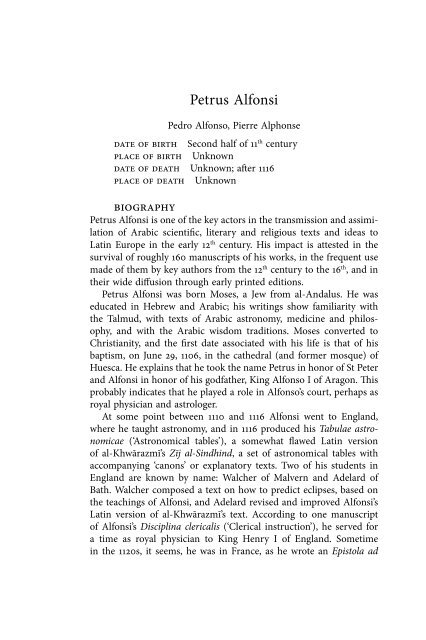
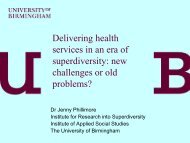
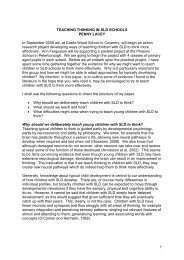
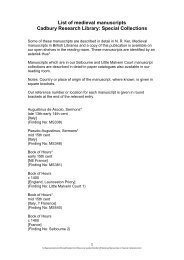
![Benyamin Asadipour-Farsani [EngD Conference abstract]](https://img.yumpu.com/51622940/1/184x260/benyamin-asadipour-farsani-engd-conference-abstract.jpg?quality=85)
